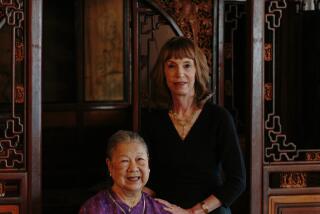Towering patriarch of the Alcotts
- Share via
IT is an inevitable byproduct of the Harry Potter phenomenon that people look to the past for books that have similarly engaged young readers. At the top of most of these lists is Louisa May Alcott’s “Little Women” (1868), which was an immediate bestseller and has certainly stood the test of time. On both sides of the Atlantic, youthful readers still thrill to the story of the March family in mid-19th century New England; in a recent survey of books that have influenced contemporary writers, it was among those most frequently cited.
“Little Women” is unmistakably autobiographical; only the most rigorous exponent of the mid-20th century “New Criticism” could fail to acknowledge that Alcott is writing about some version of her own family, and this kind of felt authenticity (in the death of a beloved sister, for instance) is key to her readers’ strong attachment to the novel. But a writer as talented as Alcott -- and one with as good a sense of what she was trying to achieve -- knew she had to make changes. This was, above all, a novel aimed at a female readership, so it made sense not only for there to be a family of four daughters (as was true in the Alcott household) but for it to be a matriarchal household, with “Marmee at its center and a father figure honorably away fighting in the Civil War. In real life, though, the Alcotts were a patriarchy, and in Bronson Alcott, as we discover in “Eden’s Outcasts: The Story of Louisa May Alcott and Her Father,” they had quite a patriarch. Louisa has so outstripped her father in terms of fame that it is now difficult to remember what a towering figure he was.
A transcendentalist teacher who lectured to audiences all over the United States, he was part of that circle including Ralph Waldo Emerson and Nathaniel Hawthorne and was in his time as renowned as they were. Bronson’s rise from rural poverty and little formal education into these exalted ranks is an amazing story, and John Matteson, associate professor of English at John Jay College in New York City, tells it with a clarity and intelligence he displays throughout this colorful and insightful book. Recounting an occasion when Emerson took his friend to Phi Beta Kappa day at Harvard and feared Alcott might feel excluded, Matteson writes: “Emerson took him by the arm. ‘We will not mince matters,’ he told his guest lightly. ‘You are a member by right of genius.’ To Alcott’s surprise and gratitude, Emerson guided him to a seat near the orator.”
One of the pleasures of reading this book is to be taken back to a time and place of intellectual and moral grandeur, when prominent religious figures took up progressive causes, such as abolitionism and female suffrage. Bronson was not a Christian minister, but Emerson urged his admission to the Transcendental Club, which was to be made up solely of ministers or former ministers, thus: “You must admit Mr. Alcott over the professional limits, for he is a God-made priest.”
Having such a man for a father was not always easy, especially for a spirited girl like Louisa. She and Bronson were exceptionally close and in some ways very much alike. There was a staunch bond between them; amazingly, they died within 40 hours of one another. Matteson encapsulates their conflict and its consequences with style and acumen:
“With her volatile temper and fierce independence, Louisa was naturally disposed to rebel, but within the Alcott family the moral grounds for rebellion posed a problem. While there were abundant reasons for questioning Bronson’s judgment, there were few who now questioned his dedication to moral purity. Emerson called him an archangel, even if he did add the word ‘tedious’ to his description. Alcott himself tried to live his life in self-conscious imitation of Christ. To rebel against a household Christ, to take up arms against an archangel, is to define oneself de facto as the Devil. When Louisa’s temper defied her efforts to soften it, when she felt frustration at the poverty that Bronson insisted was virtuous, or when he greeted her impulsiveness with cool disapproval or hapless incomprehension, she must have wondered whether she might not truly be a demon after all.”
One of this book’s virtues is that its author, in acknowledging Bronson’s greatness, does not shy away from describing the elder Alcott’s foibles while keeping them in perspective. Similarly, he makes clear just how Louisa harnessed her passion and her discontents in order to live in a productive way.
Perhaps the most fascinating part of “Eden’s Outcasts” concerns Louisa’s brief but hectic spell as a nurse tending wounded soldiers in Civil War Washington; the atmosphere and turmoil in the aftermath of the bloody Battle of Fredericksburg are vividly evoked. Run down from overwork in the terrible conditions of the hospital, she became desperately ill with typhoid fever, and her father had to fetch her home, where she lay near death. She survived, but, as it turned out, the huge doses of mercury in the calomel the Army doctors had given her had poisoned her system irrevocably, making the remaining quarter-century of her life a torment of pains and other debilitating symptoms. It is moving to realize that she wrote her books under these difficult circumstances. In producing such a rounded, detailed and compelling portrait of Louisa, Bronson, their family and their times, Matteson has provided us with a valuable context for appreciating that enduring masterpiece “Little Women.”
Martin Rubin is a critic and the author of “Sarah Gertrude Millin: A South African Life.”
--
Eden’s Outcasts
The Story of Louisa May Alcott and Her Father
John Matteson
W.W. Norton: 498 pp., $29.95
More to Read
Sign up for our Book Club newsletter
Get the latest news, events and more from the Los Angeles Times Book Club, and help us get L.A. reading and talking.
You may occasionally receive promotional content from the Los Angeles Times.










